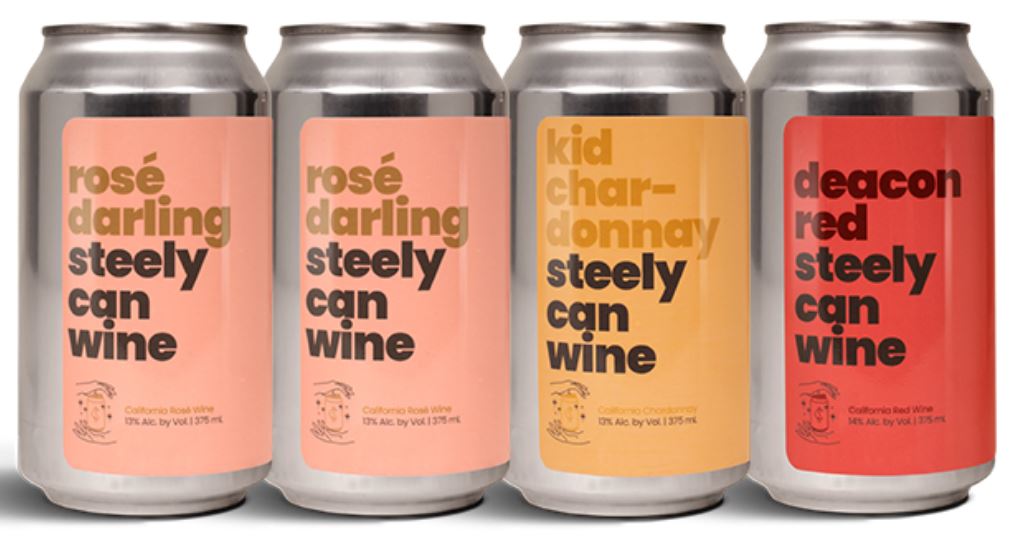- The FTC’s Ban on Noncompetes Might Die in Court, But the Legal Tide Still Runs Against Them
- Can You Cash in By Claiming a Trademark on a Trending Nickname, Slang Word, or Phrase?
- Businesses Beware: Using AI to Create Fake Celebrity Advertisements Can Get You in Trouble
- Virginia’s New Law on College Student-Athlete NIL: Is Virginia a Leader or Irrelevant?
- Would a U.S. Ban on TikTok Stand Up In Court? What Can Businesses Do if a Ban is Enacted?
Latest Blog Posts
Reelin’ in the Legal Problems: Is a Local Yacht Rock Band’s Steely Dan Tribute Wine a Trademark Problem?

Let’s take a survey.
There’s a new wine-in-a-can product called “Steely Can.” Three kinds of wine are offered: “Rosé Darling,” “Kid Chardonnay,” and “Deacon Red.” If you are over, say, 40, you will get the reference to the rock-jazz band Steely Dan and three of its most famous songs: “Rose Darling,” “Kid Charlemagne,” and “Deacon Blues.”
Do you think this wine product was produced by Steely Dan or made under a license from it? If you answered “yes” or even “I wonder if they are connected?”, then the entrepreneurs who make the wine have a trademark problem.
This isn’t hypothetical. This line of wine-in-a-can was recently launched by the local yacht rock cover band “Three Sheets to the Wind.”
Let’s use this situation to examine a bigger question: When can you reference the name of a famous product in the name of your product?
The safe way is to get permission from the maker of the famous product. Here, the wine business would be covered if it got permission or bought a license from Steely Dan, which I understand it did not do.
If you don’t get permission, the issue is whether some consumers will think you are affiliated with or endorsed by the maker of the famous product. Here, will some people think Steely Can came from Steely Dan or was licensed by it?
You can avoid being a trademark infringer if you successfully pull off a parody. A parody is where you reference something famous and also poke fun at it, so people understand you aren’t the famous thing itself. In recent years, some makers of parody products have overcome legal challenges from the makers of the famous referenced products.
In the early 2000s, a company named Haute Diggity Dog made parody dog toys with names such as Chewy Vuiton, Chewnel No. 5, Furcedes, and Sniffany & Co. The maker of Louis Vuitton luxury goods sued Haute Diggity Dog for trademark infringement and trademark dilution. Haute Diggity Dog beat the lawsuit by persuading the courts that the public would get the joke and understand these products did not come from Louis Vuitton.
The same thing happened more recently when a company named VIP Products began selling parody dog toys, including one bearing the name “Bad Spaniels” in the shape of a bottle resembling Jack Daniel’s Old No. 7 Tennessee Whiskey. The label on that parody product added “the Old No. 2, on your Tennessee Carpet.” Jack Daniel’s Properties sued, claiming trademark infringement and dilution. VIP Products won for the same reason as Haute Diggity Dog – the parody was evident so no one would think the whiskey maker made the dog toy.
Do those cases mean Steely Can wine is in the clear? Not necessarily.
To be a successful parody, the parody name must convey two contradictory messages. It must call to mind the famous product but also use humor, satire, or ridicule to clearly signal to the public that the parody product isn’t associated with the famous original. I’m not sure the clear signal part is there for Steely Can.
That doesn’t mean Steely Can violated trademark law. The ultimate question is whether consumers will be confused about whether the wine and Steely Dan are related. A successful parody defeats the possibility of such confusion. Without the humor part of the parody, it may be unclear to consumers that the wine and Steely Dan are unrelated.
One factor in the analysis will be whether Steely Dan itself uses its name on alcohol products or anything related to or commonly sold with them. I see no evidence that Steely Dan ever got into the alcohol business. But would some consumers think a wine named Steely Can is associated with the famous band because alcohol is frequently sold at concerts and many rock bands are associated with the party-hearty lifestyle?
There is a second legal landmine tribute businesses such as Steely Can must avoid: trademark tarnishment. Tarnishment may occur if your parody product is for something distasteful or controversial, such as pornography, drugs, alcohol, or firearms.
The lyrics of Steely Dan are rife with references to illicit activities, such as drug dealing (“Kid Charlemagne”), pregnancy from adultery (“Haitian Divorce”), and sex with minors (“Everyone’s Gone to the Movies”). I don’t see how wine in a can could tarnish that reputation. Indeed, the name “Steely Dan” refers to a steam-powered dildo in the William S. Burroughs novel “Naked Lunch.”
Ironically, “Kid Charlemagne” is about a drug dealer cutting it close to getting caught. (“clean this mess up or we’ll end up in jail”). Steely Can is cutting it close on trademark issues. Will the legal day come when its whole business world falls apart and fades away?
Written on September 20, 2022
by John B. Farmer
© 2022 Leading-Edge Law Group, PLC. All rights reserved.




